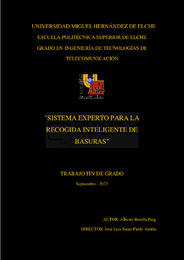Por favor, use este identificador para citar o enlazar este ítem:
https://hdl.handle.net/11000/31622Registro completo de metadatos
| Campo DC | Valor | Lengua/Idioma |
|---|---|---|
| dc.contributor.advisor | Sainz-Pardo, José Luis | - |
| dc.contributor.author | Botella Puig, Alberto | - |
| dc.contributor.other | Departamentos de la UMH::Ingeniería de Comunicaciones | es_ES |
| dc.date.accessioned | 2024-03-01T07:58:54Z | - |
| dc.date.available | 2024-03-01T07:58:54Z | - |
| dc.date.created | 2023-09 | - |
| dc.identifier.uri | https://hdl.handle.net/11000/31622 | - |
| dc.description.abstract | En la actualidad, existen muchos problemas medioambientales a los que se les debe buscar soluciones cuando antes. Es por ello por lo que, proyectos con la finalidad de, por ejemplo, reducir la contaminación acústica o atmosférica, entre otros, están a la orden del día. En el presente proyecto, se pretende introducir una idea para lograr tal reducción en la contaminación que se sufre en las ciudades, proponiendo una monitorización de los contenedores de reciclaje. El objetivo tras esta monitorización consistiría en aumentar la ineficiencia que existe en la recogida de dichos contenedores debido al seguimiento lineal que tienen. Ya que siguen una hoja de rutas por la que pasan por todos los contenedores designados, independientemente de si están llenos, o no. Dicha monitorización permitiría saber el estado en el que se encontrarían los contenedores, permitiendo observar y decidir cuáles deben ser, o no, recogidos cuando se realice la ruta con el camión de reciclaje. Esto permitiría una optimización de la ruta que siguen estos, consiguiendo un ahorro en gasolina y en ruido acústico provocado por el camión, en grandes ciudades, sobre todo. La idea consistiría en implantar sensores a los contenedores de reciclaje, de tal manera que recojan datos sobre el volumen de los mismos. Dichos datos serían enviados vía Internet hacia una base de datos que estaría a disposición o de los servicios municipales o de la empresa encargada de dicho trabajo. Con esos datos, se decidirían qué contenedores no se deben recoger, imponiendo un umbral que será decidido por la entidad encargada de la recogida. Por último, un programa recogerá la valoración final, y buscará la ruta óptima que debe seguir el camión para recoger los contenedores de interés. | es_ES |
| dc.description.abstract | Currently, there are many environmental problems to which solutions must be sought as soon as possible. That is why, projects with the purpose of, for example, reducing acoustic or atmospheric pollution, among others, are the order of the day. In the present project, it is intended to introduce an idea to achieve such a reduction in the pollution suffered in cities, proposing a monitoring of recycling containers. The objective after this monitoring would be to increase the inefficiency that exists in the collection of said containers due to the linear monitoring that they have. Since they follow a route sheet through which they go through all the designated containers, regardless of whether they are full or not. Said monitoring would allow knowing the state in which the containers would be, allowing observing and deciding which ones should be, or not, collected when the route is made with the recycling truck. This would allow optimization of the route followed by these, achieving savings in gasoline and acoustic noise caused by the truck, especially in large cities. The idea would consist of implanting sensors in recycling containers, in such a way that they collect data on their volume. Said data would be sent via the Internet to a database that would be available to either the municipal services or the company in charge of said work. With these data, they would decide which containers should not be collected, imposing a threshold that will be decided by the entity in charge of the collection. Lastly, a program will collect the final evaluation, and will search for the most optimal route that the truck must follow to collect the containers of interest. | es_ES |
| dc.format | application/pdf | es_ES |
| dc.format.extent | 70 | es_ES |
| dc.language.iso | spa | es_ES |
| dc.publisher | Universidad Miguel Hernández de Elche | es_ES |
| dc.rights | info:eu-repo/semantics/openAccess | es_ES |
| dc.rights | Attribution-NonCommercial-NoDerivatives 4.0 Internacional | * |
| dc.rights.uri | http://creativecommons.org/licenses/by-nc-nd/4.0/ | * |
| dc.subject | contaminación | es_ES |
| dc.subject | ciudad | es_ES |
| dc.subject | monitorización | es_ES |
| dc.subject | contenedor de reciclaje | es_ES |
| dc.subject.other | CDU::6 - Ciencias aplicadas::62 - Ingeniería. Tecnología | es_ES |
| dc.title | Sistema experto para la recogida inteligente de basuras | es_ES |
| dc.type | info:eu-repo/semantics/bachelorThesis | es_ES |

Ver/Abrir:
TFG-Botella Puig, Alberto.pdf
2,09 MB
Adobe PDF
Compartir:
 La licencia se describe como: Atribución-NonComercial-NoDerivada 4.0 Internacional.
La licencia se describe como: Atribución-NonComercial-NoDerivada 4.0 Internacional.
.png)